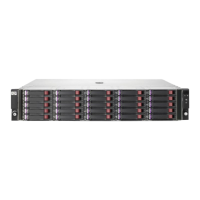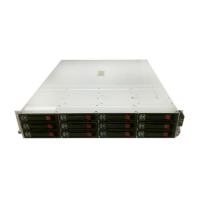3 Fibre Channel routing
This chapter describes Fibre Channel routing in an HP SAN environment. It describes the following
topics:
• Fibre Channel routing overview, page 61
• SAN scaling and routing, page 63
• Fibre Channel routing implementations, page 64
• Fabric redundancy and routing, page 69
• Supported routing configurations, page 71
Fibre Channel routing overview
Fibre Channel routing facilitates the development and management of higher-capacity SANs,
significantly increasing device connectivity. By enabling communication between two or more physically
independent fabrics, multiple logical fabrics, or VSANs, routing provides high levels of SAN scalability.
Each fabric, logical fabric, or VSAN maintains a unique fabric services configuration.
NOTE:
In the context of Fibre Channel routing, the terms "fabric," "Virtual Fabric," and "VSAN" are used
interchangeably. HP does not support using the B-series Fibre Channel routing, 1606 Extension SAN
Switches or DC Dir Switch MP Extension Blades, Multi-protocol Routers, or B-series Virtual Fabrics-IFR
with C-series IVR functionality in the same SAN configuration.
HP only supports routing devices connected to H-series switches through TR_Ports to devices in B-series
and C-series fabrics.
Routing enables independent fabrics, Virtual Fabrics with IFR, or VSANs with IVR to dynamically share
devices without the need to reconfigure or re-cable physical connections.
Routed fabrics, Virtual Fabrics with IFR, or VSANs with IVR can consolidate management interfaces.
Instead of one management interface per fabric, there can be one per SAN, or two per SAN, if
redundant fabrics are used.
Routing using the TR feature of the H-series switches does not provide consolidated management of
the routed fabric.
Fibre Channel routing features include:
• Increased SAN scalability
• Interconnecting (not merging) multiple physical fabrics, Virtual Fabrics, or VSANs
• Overcoming individual fabric scaling limits
• Improved device access and sharing
• Sharing devices dynamically across multiple fabrics, Virtual Fabrics, or VSANs
• Increasing device utilization
• Fabric, Virtual Fabric, or VSAN independence
SAN Design Reference Guide 61

